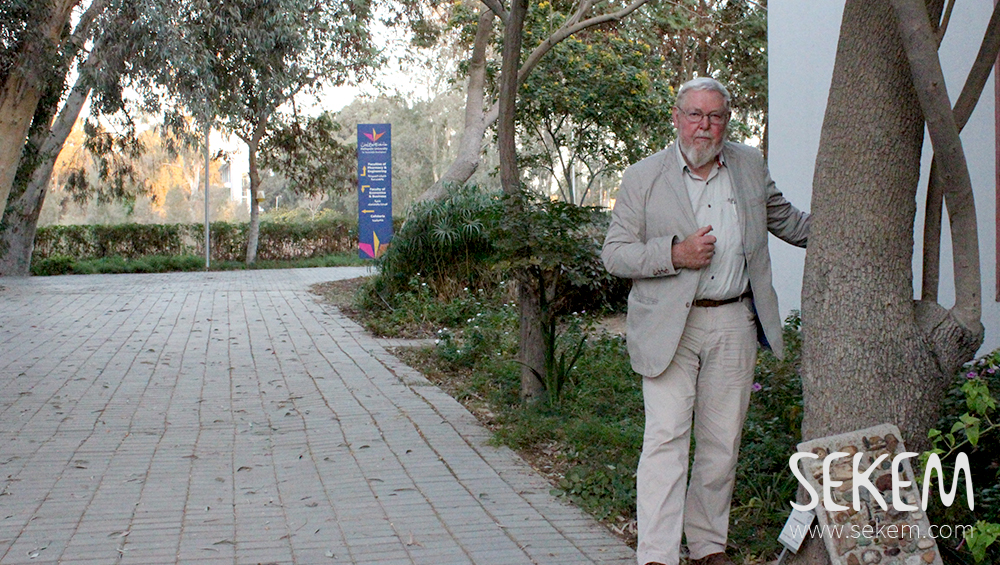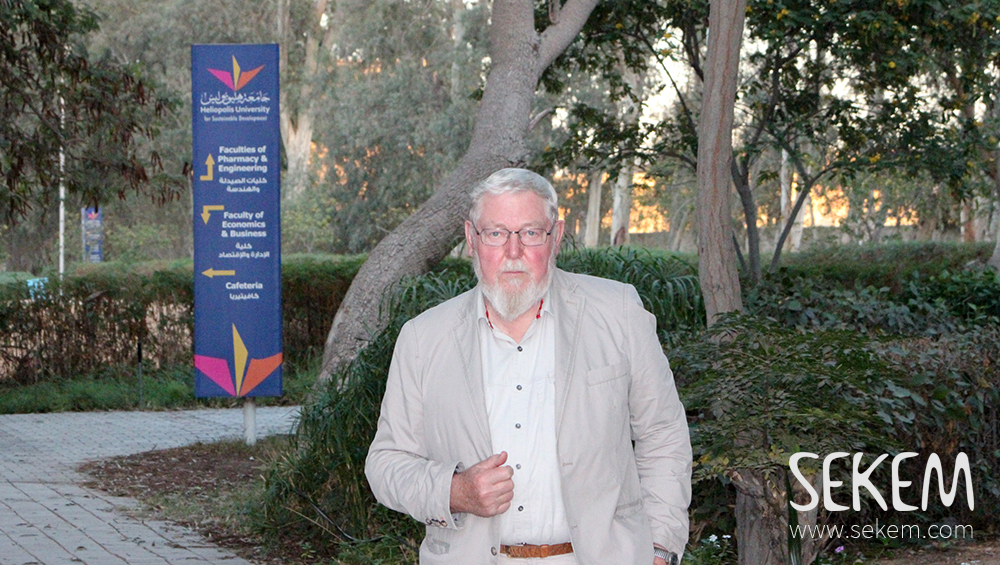Dr. Michael Succow has worked for the protection of nature around the world for decades. In 1997, he was awarded with the Alternative Nobel Prize for his work. With SEKEM News, Dr. Michael Succow spoke about the SEKEM model, his love for nature and the challenges of today’s generations.
SEKEM News: At the Heliopolis University for Sustainable Development, you have already given a lecture on biosphere reserves. What is your first impression?
Dr. Michael Succow: I am very touched. This morning I got to know the SEKEM Farm and now the Heliopolis University for Sustainable Development. Here it does not seem that scientists have an idea and then implement it, as is usual, but they rather build on a strong, pragmatic background. SEKEM has been practicing sustainable development for the last 39 years and has become an ever-growing initiative that deals with the land in a sustainable way and produces ecological products with a value and a cultural asset. This is connected with the educational task of the university and SEKEMs schools, which are very special. I would not have expected that – it exceeds my hopes by far. Something was formed here that gives work to a lot of people, produces something sensible and enables a large number of young people, including women, to develop. This is particularly impressive in the present time, which is characterized by so many negative developments. The holistic approach, the integration of art, culture and technology and the search for alternatives that connect with our way of life, are really great. I have not experienced anything comparable in newly industrialized countries.
SN: You have been on the road for a long time, and you are committed to the protection of nature – especially in Asia. How did your visit to Egypt come about?
Dr.M.S.: About six years ago, I met Dr. Ibrahim Abouleish at a gathering of the Alternative Nobel Laureates. I remembered him because he established this great project in Egypt. Last summer, I then met his son Helmy Abouleish in Germany. I told him about Ethiopia, where we are currently implementing a sustainable project in the form of a biosphere reserve. Helmy invited me to get to know the SEKEM model in Egypt.

SEKEM as alternative model
SN: How do you rate the SEKEM model for sustainable development in harmony with people and nature now, after you’ve seen it?
Dr.M.S.: It is successful. Many wonderful initiatives and utopias fail in the short term. Here, something has been built up by people who are not frustrated yet, but who want to make a lasting change. I always compare these people with locomotives, who are ready to pull the loaded wagons behind them. There are many people who want to do something good – but we need locomotives that are motivated and firm. SEKEM is such a locomotive.
SN: Do you think that SEKEM can also serve as a role model for Western companies?
Dr.M.S.: Yes. The SEKEM companies produce high-quality products under good conditions and also export them to Europe. It is extremely important that such partners, of whom we know, exist and that they are dignified with the environment and the people. In addition, SEKEM is a wonderful starting point for Germany in order to carry out common development cooperation in those difficult countries, from where the refugee flows are currently coming from. Common development cooperation, which does not destroy further, but really stabilize on the ground. This is a benefit for both sides and shows that there are alternatives that raise hope.
SN: You are, like SEKEM and Dr. Ibrahim Abouleish, also a laureate of the Right Livelihood Award – also known as Alternative Nobel Prize. What does this award mean to you?
Dr.M.S.: The Alternative Nobel Prize is a special award for me. It was founded by a man who had visions and invested his private wealth in order to pay attention to topics such as ecology and human rights in addition to chemistry, physics or medicine. It is a prize that has been created to counter the growing failure of civilization – compared to the Nobel Prize which is usually awarded for new inventions and knowledge advances, which usually make people moving further from their roots. I have certainly lived quieter before. Now I am driven by visions. My wife had expected me to watch the world at the age of 75 and reading books – which would be more suitable for a retired university lecturer. Instead, I am dealing with people of different religions, socializations and cultures, who have similar thoughts and worries about the future as I do. I would like to act as a link and build networks that give people hope and form a force with like-minded people. This is certainly a big challenge in today’s world, but it makes me happy.
“Without love nothing essential can arise”
SN: With the prize money for the Alternative Nobel Prize, you have founded the Michael Succow Foundation for the Protection of Nature. What are your main concerns?
Dr.M.S.: Firstly, I thought that I could found this foundation with the 100,000 Deutsche Mark. But the amount of money is relatively small and I quickly realized that it is not possible without common allies. There can arise a lot with the support of like-minded people. And so we have built up a foundation with deep ideals, which now works at many locations and focal points in the world. These are about 15 poor and difficult countries, such as the succession states of the Soviet Union, or countries that have experienced socialism, such as Cuba or Ethiopia. We are involved in many projects dealing with biosphere reserves to develop ecological economic regions and to promote ecological education. The focus lies on the conservation of wetlands, which are to dry because of the climate change. The foundation helps to stabilize biodiversity and to look for alternatives in land use.
SN: What was the reason for your strong bond and commitment to nature?
Dr.M.S.: Seeds are usually planted in childhood. My mother was very close to nature. Through her deep relationship with nature, also my love for nature has arisen. I believe that without love, nothing essential can arise. If one connects the love with responsibility then, and with responsibility acting instead of only talking, then something develops. In addition, a fourth component is needed: the knowledge. Love, responsibility, action and knowledge form a chain. If you have understood that, you can’t do anything but getting involved. Through my work, I am able to give something back, and I am not just the kind of guy who wants to enrich himself. And then suddenly you are surrounded by many people who also have these ideals. Such a community is a great luck.

SN: You once said: “The protection of nature is one of the most important social contributions for the future”. However, many people have lost the relationship to nature because of technology and digitization. What has to change so that the protection of nature becomes important again?
Dr.M.S.: Without intact nature, there is no intact society. And if society is not intact, there won’t be healthy people. Everything depends on each other. Nature is our livelihood. Some will alienate themselves from nature. At the same time, in many developing countries, I see people gathering experiences and immersing themselves in nature. And it is similar in our civilization. Parents, for example, start to remember their childhood activities and want to experience a farm, a horse or a piece of meadow again. These memories and experiences are still alive despite the alienation. I have an ecological garden that gives me a lot of strength. On Sundays, I do not have to go to church, but am there. Then I hear the bells ringing while I watch my humus, my earthworms and my fruits – that is for me comparable to a worship service. Through these natural touches, we slowly reconcile ourselves with nature instead of fighting against it and life with chemistry and technology.
Telling truths and supporting the youth
SN: If we start from today’s point of view and the current development: Where do you see our world in 50 years?
Dr.M.S.: This is a very difficult question. I recently attended at a conference with politicians and NGOs. In my lecture the starting point was that mankind is getting older – in 83 years we will have reached year 2100. This is about the range of a human life. When I see what needs to be changed in this human life to get one’s act together, I am very worried. We know it’s too late soon, but we pretend like everything can go on forever. Berthold Brecht once said: “And they sat on the trees. And they sawed at their branches. And they shouted joyfully at each other how to improve the sawing and crashed into the depths.” Today, the situation almost looks like that. The tree, however, will come into leaf again and begin a new cycle, but without us.
SN: What must change so that this won’t happen?
Dr.M.S.: We have to tell the truth rather than lie to ourselves saying that everything is under control. I used to protect nature from man. I saw myself as a lawyer of nature. As I grew older, I realized, it was not about nature, but about us humans and about our future. Are we sustainable or are we just an episode in this great ecologically constructed house named earth? The project “nature” continues and has mastered any form of species extinction. The higher creatures died out, and then the bacteria and viruses were released again and again. The alienation of nature, which results in the destruction of our livelihood, and globalized capitalism, which only wants to grow and exploit, is not sustainable. Today’s social models are, in my opinion, doomed to failure. On the other hand, I experience a lot of communities in the world, such as the SEKEM Initiative, which are survivable and do not operate at the expense of nature, but pay close attention to nature and deal with it carefully. There must be a fundamental rethinking, to which the old are no longer capable. Youth is in demand. We have to learn again from nature with humility.
SN: You have taught as professor at the university for a long time. What do you advice your students or young people in regards to their future?
Dr.M.S.: First of all, young people need knowledge. You have to get rid of an animation society that has only the target of selling something. Then they should think about their energy consumption and whether they really have to buy denatured food, from which only individuals benefit a lot. There are always alternatives. In addition, it is important to get together and form networks – you cannot stand alone in a world full of wounds. Through mutual support, one can also get rid of the pride and arrogance. For young people in Germany, it is important to get to know the world and to realize that we enjoy a prosperity that the world cannot bear any longer. When doing so, they should not appear as the great makers, but join and develop projects with humility, which give hope. And always keep in mind: Without nature, we are not able to exist. If we destroy nature, we will perish too. This thin line between preservation and destruction can only be achieved by a society which understands itself as part of nature and respects nature in ethics.
Interview: Nils Daun
SEKEM is an Encouraging Example: Interview with Hannes Jaenicke
Combating Egypt’s Desertification by Creating Awareness for the Beauty and Values of Nature
Here you can find further information about the Michael Succow Foundation for the Protection of Nature

